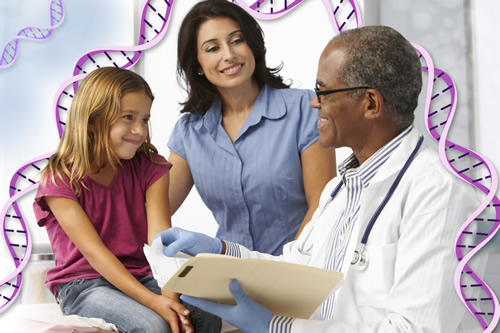Last updated: May 02, 2017
Webinars for Health Insurers and Payers: Understanding Genetic Testing
Webinars for Health Insurers and Payers: Understanding Genetic Testing
 To address the growing need for medical staff in the insurance industry to understand genetic testing, the National Human Genome Research Institute (NHGRI) has collaborated with the Blue Cross Blue Shield Association to produce this educational webinar series. The goal is to prepare insurers to understand genetic testing strategies, interpretations, outcomes and patient care, and use that understanding in making sound decisions regarding the healthcare activities of their insured.
To address the growing need for medical staff in the insurance industry to understand genetic testing, the National Human Genome Research Institute (NHGRI) has collaborated with the Blue Cross Blue Shield Association to produce this educational webinar series. The goal is to prepare insurers to understand genetic testing strategies, interpretations, outcomes and patient care, and use that understanding in making sound decisions regarding the healthcare activities of their insured.
Starting in June 2015, thirteen live webinars were produced by volunteer experts in genetic and genomic medicine and testing. Each session was recorded by the association and is now made publicly available at no cost here.
This effort arose from NHGRI's Insurer Education Working Group of the Inter-Society Coordinating Committee for Practitioner Education (ISCC), beginning in early 2015.
Presentations
June 18, 2015
 Understanding the Fundamentals: The Language of Genetics
Understanding the Fundamentals: The Language of Genetics
Presenter: Bob Wildin, M.D.
National Human Genome Research Institute, NIH
![]() Video | Transcript | Slides
Video | Transcript | Slides![]()
The presentation begins with a case study of a 6-year-old boy, "Roger", struggling in class and presenting with short stature. Next, Dr. Wildin reviews basic genetic terminology, including genes/gene structure, genotype, phenotype, penetrance, expressivity, inheritance, variation, mutation types, and how genes are linked to disease. With an understanding of basic genetic principles, participants are asked specific questions about the case. Dr. Wildin reviews answers that lead to a diagnosis for "Roger" that has implications for his family members.
July 14, 2015
 Genetic Testing: Who and Why?
Genetic Testing: Who and Why?
Presenter: Kaylene Ready, M.S. C.G.C.
Director, Inherited Cancer at Counsyl
![]() Video | Transcript | Slides
Video | Transcript | Slides![]()
Different types of genetic tests are described in this webinar, including tests for symptomatic and asymptomatic individuals, tests of an individual's germline to benefit family, and tests of DNA from cancer cells. Goals of genetic testing are presented, including the use of testing for clinical versus molecular diagnosis, as well as principles of clinical utility.
August 11, 2015
 The Evidence for Genomic Testing - Analytic Validity, Clinical Validity and Clinical Utility
The Evidence for Genomic Testing - Analytic Validity, Clinical Validity and Clinical Utility
Presenter: Elaine Lyon, Ph.D.
University of Utah School of Medicine
![]() Video | Transcript | Slides
Video | Transcript | Slides![]()
To understand the evidence for the evaluation of genetic testing and how it differs from other evidence-based decisions, Dr. Lyon describes the "ACCE" framework for evaluating analytic and clinical validity and utility. Ethical, legal and social implications are discussed as well. Genetic tests can reduce morbidity/mortality, provide information to manage patient/family members, and assist with reproductive decision-making. In addition, Dr. Lyon describes the process called "Evaluation of Genomic Applications in Practice and Prevention" (EGAPP). Professional society clinical guidelines are also described.
September 8, 2015
 Understanding What Can Be Diagnosed by Which Genetic Test
Understanding What Can Be Diagnosed by Which Genetic Test
Presenter: David Flannery, M.D.
American College of Medical Genetics and Genomics
![]() Video | Transcript | Slides
Video | Transcript | Slides![]()
To understand the uses of genetic tests and to determine if the correct test was ordered, Dr. Flannery reviews different types of genetic tests, principles of testing, and the outcomes and clinical utility of genetic tests. He presents practice guideline-based approaches to selecting tests based on patients' clinical presentations. He provides additional detail on whole chromosome versus molecular and biochemical genetic tests, including cytogenetic tests (karyotyping and fluorescent in situ hybridization (FISH) tests) and molecular tests. Dr. Flannery also describes single gene sequencing, deletion/duplication testing chromosomal microarray (CMA) testing and detection of trinucleotide repeats.
October 13, 2015
 Overview of the AMA Molecular Pathology CPT codes
Overview of the AMA Molecular Pathology CPT codes
Presenter: Victoria Pratt, Ph.D.
Indiana University School of Medicine
![]() Video | Transcript | Slides
Video | Transcript | Slides![]()
Dr. Pratt provides an overview of Current Procedural Terminology (CPT) codes, including the creation of new American Medical Association CPT codes for molecular pathology (MolPath). She also describes the process of submitting a coding change proposal (CCP) when a gene/analyte is not present in the current code set. She also describes how CMS determines laboratory services reimbursement.
November 10, 2015
 Understanding the Genetic/Genomic Testing Strategy
Understanding the Genetic/Genomic Testing Strategy
Presenter: Benjamin Solomon, M.D.
Innova Translational Medicine Institute
Video and transcript not available. | Slides![]()
Dr. Solomon provides an overview of genetic/genomic testing, then describes a series of cases with associated pedigrees for each. Cases include cancer patients, one with a BRCA1 mutation and another with Li-Fraumeni Syndrome. He outlines factors important in selecting genetic tests. He also describes congenital cases. Dr. Solomon provides recommendations for targeted tests versus limited panel testing versus more extensive testing.
December 8, 2015
 Selecting the Right Genetic Test
Selecting the Right Genetic Test
Presenter: Maren Scheuner, M.D.
David Geffen School of Medicine at UCLA
VA Greater Los Angeles Healthcare System
Dr. Scheuner describes reasons for genetic testing and the steps towards developing a differential diagnosis. She describes common molecular techniques and explains genetic testing errors. Dr. Scheuner illustrates these concepts with cases and pedigrees. Cases include a patient with pancreatitis, a brother with arrythmia, several breast cancer examples, and a Lynch syndrome patient. When selecting the right genetic test, the clinical context is a key factor in making the correct selection.
![]() Video | Transcript | Slides
Video | Transcript | Slides![]()
January 12, 2016
 Understanding the Application: NGS Panel Testing for Genetic or Hereditary Conditions Other Than Hereditary Cancer Syndromes
Understanding the Application: NGS Panel Testing for Genetic or Hereditary Conditions Other Than Hereditary Cancer Syndromes
Presenter: Birgit Funke, Ph.D.
Partners HealthCare | Personalized Medicine
![]() Video | Transcript | Slides
Video | Transcript | Slides![]()
Dr. Funke describes next-generation sequencing (NGS) with a focus on gene panel testing for inherited conditions. She addresses questions including: Which disorders benefit from panel testing? Which genes should be on a panel? How to assess clinical validity of variants and genes? How to classify variants of unknown significance? Using examples including inherited cardiomyopathies, Dr. Funke explores how panel testing can improve clinical diagnoses, influence clinical management and prevent the "diagnostic odysseys". She also analyzes the role that cost plays in decisions about which tests to perform. Dr. Funke explores the changing genomic testing workflow and the trend towards genome wide testing, as well as current debates about using panels or exome testing. She emphasizes that curating the validity of gene-disease relationships is essential.
February 9, 2016
 Understanding the Application: NGS Panel Testing for Hereditary Cancer Syndromes and Cancer Targeted Therapy
Understanding the Application: NGS Panel Testing for Hereditary Cancer Syndromes and Cancer Targeted Therapy
Presenter: Felicitas L. Lacbawan, M.D., F.C.A.P., F.A.C.M.G.
Medical Director, Genetics
Quest Diagnostics Nichols Institute
![]() Video | Transcript | Slides
Video | Transcript | Slides![]()
Dr. Lacbawan begins with an overview of cancer risk and the value of understanding if cancer is due to an inherited pathogenic variant/mutation. She explores family history and how to evaluate inherited susceptibility to cancer. Using examples including hereditary breast cancer, Dr. Lacbawan explores the diagnostic applications of sequencing, comparing when to use next generation cancer gene panels versus gene by gene testing. She notes that existing mutation databases and a newly created public/private organization are expected to enhance the clinical utility of genetic results. She explores solid tumor analysis by NGS, explaining that annotation is directed at FDA-approved drugs in selected tumor types. She describes NGS multigene cancer panels and their uses, noting that guidance for decision making is an evolving concept, varying with patient, clinician, guideline committee and payer. Dr. Lacbawan also reviews the multigene tissue (somatic) report and other sequencing approaches.
March 8, 2016
 Analytical Validity - What is it and how do you measure it?
Analytical Validity - What is it and how do you measure it?
Presenter: Julia Elvin M.D., Ph.D.
Senior Associate Medical Director & Senior Pathologist
Foundation Medicine
![]() Video | Transcript | Slides
Video | Transcript | Slides![]()
Dr. Elvin provides an overview of the clinical value of next-generation sequencing (NGS) of tumors, as well as in-depth analyses of laboratory technical challenges. Because the majority of medical decisions are based on diagnostic test results, analytic validation is critical. She defines analytic validity and identifies organizations who evaluate analytic validity, describing both similarities and differences between different organization's guidelines. Dr. Elvin emphasizes the importance of minimizing laboratory technical variability so that biologic variability can be understood and analyzed. Thus, translating research grade NGS to a clinical cancer diagnostic assay requires extensive optimization and investment. She describes these challenges with several examples of cancer genome sequencing and drug selection. Dr. Elvin also provides details of several NGS validation studies, associated publications, and the importance of demonstrating high accuracy and reproducibility for clinical use.
April 12, 2016
 Navigating the Regulatory and Compliance Environment in Clinical Laboratory Testing
Navigating the Regulatory and Compliance Environment in Clinical Laboratory Testing
Presenter: Victoria Pratt, Ph.D.
Director, Pharmacogenomics
Laboratory, Department of Medical and Molecular Genetics, Indiana University School of Medicine
![]() Video | Transcript | Slides
Video | Transcript | Slides![]()
Dr. Pratt reviews clinical laboratory regulations and oversight and describes clinical laboratory technical procedures and terms. She points out differences between regulations (the law) and guidelines for accreditation which come from organizations such as the College of American Pathologists (CAP) and New York State Department of Health (NYSDOH). She describes the Clinical Laboratory Improvement Amendments (CLIA) law passed by Congress to establish quality standards for laboratory testing. She illustrates test categorization schemes and usage, including FDA-cleared/approved, investigational use only, and laboratory developed tests (LDTs). Dr. Pratt defines analytical validation, verification, sensitivity, precision, bias, and others. She provides several examples and concludes by emphasizing the importance of understanding clinical testing regulations when performing clinical laboratory services.
May 10, 2016
 Whole Exome/Whole Genome Testing: Comparison to Panels
Whole Exome/Whole Genome Testing: Comparison to Panels
Presenter: Robert Nussbaum, M.D.
Chief Medical Officer, Invitae Corp., Emeritus Professor of Medicine, UCSF
![]() Video | Transcript | Slides
Video | Transcript | Slides![]()
Dr. Nussbaum begins with descriptions of panels, whole exome sequencing (WES) and whole genome sequencing (WGS). He provides additional details describing exons within the context of genes. He also provides an overview of sequencing technologies, including next generation sequencing (NGS). He then describes technical challenges of sequencing, including information on how improving random coverage can increase costs. Dr. Nussbaum describes the opportunities and challenges presented by sequencing using panels, WES and WGS, presenting data from published studies. He also reviews recommendations for handling incidental and secondary findings, including a review of ongoing controversies. Dr. Nussbaum concludes with a review of the intersection of clinical care and gene discovery with respect to human genetics and undiagnosed diseases.
June 14, 2016
 Ethical Considerations of Genetic Testing
Ethical Considerations of Genetic Testing
Presenter: Kimberly A. Quaid, Ph.D.
Professor in the Department of Medical and Molecular Genetics
Indiana University School of Medicine
![]() Video | Transcript | Slides
Video | Transcript | Slides![]()
Dr. Quaid explains the basis for the creation of the "Ethical, Legal and Social Implications (ELSI) Program" of the human genome project, specifically, the concept that the new technology of gene identification will engender problems that can be minimized if anticipated and dealt with promptly. She defines predictive genetic tests, pre-symptomatic testing, susceptibility testing, carrier screening, prenatal genetic testing, and newborn screening; all are associated with challenging ethical issues. Dr. Quaid explores challenges raised with direct-to-consumer testing, and insurance/employment/law enforcement discrimination. She discusses the Genetic Information Nondiscrimination Act (GINA) and the Affordable Care Act. Dr. Quaid concludes by highlighting areas for concern, including the need for more genetics education among consumers and health care providers, the use of genetic test results by third parties, insurers, employers, law enforcement, and whether recent laws passed to prevent discrimination in employment and health care actually do so.
April 19, 2017
 Pharmacogenetics
Pharmacogenetics
Presenter: Victoria Pratt, Ph.D.
Department of Medical and Molecular Genetics
Indiana University School of Medicine
![]() Video | Transcript | Slides
Video | Transcript | Slides![]()
Pharmacogenetics is the study of how different groups of people respond to drugs, based on their genetic makeup. This session will explore some common drugs and the genetics of their metabolism; will also overview pharmacogenetic nomenclature, and lastly, will review guidelines that support pharmacogenetic testing.
Last Updated: May 2, 2017
